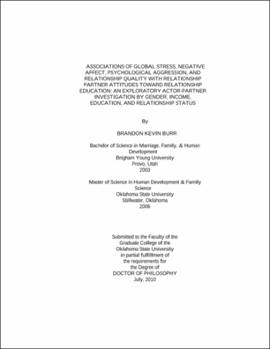| dc.contributor.advisor | Gardner, Brandt C. | |
| dc.contributor.author | Burr, Brandon Kevin | |
| dc.date.accessioned | 2013-12-10T18:04:16Z | |
| dc.date.available | 2013-12-10T18:04:16Z | |
| dc.date.issued | 2010-07 | |
| dc.identifier.uri | https://hdl.handle.net/11244/7695 | |
| dc.description.abstract | Scope and Method of Study: Quantitative | |
| dc.description.abstract | Findings and Conclusions: Couples relationship education (CRE) is a resource that has been instigated to curb divorce rates and promote healthy couple relationships. Yet, couples at higher risk for relationship difficulty, including lower-income couples, are largely underrepresented in CRE programs. Family Stress and Human Ecological theoretical underpinnings highlight how aspects of the lower-income experience can influence relationships, and also associate with relationship partners' attitudes toward CRE. This study sought to investigate how factors well-known to be associated with relationship quality might also associate with partner attitudes toward CRE, and how these associations may vary by gender, income, education, and relationship status. Partner attitudes toward CRE were measured using self-report and observational methods. Dyadic level analyses were conducted on 99 couples utilizing the Actor-Partner Interdependence model and chi-square difference testing to detect moderation. Results showed a dyadic, partner-level pattern as most pronounced as associated with attitudes toward CRE in males and females. More pronounced psychological aggression in men was negatively associated with attitudes toward CRE in females using self-report data, and more pronounced psychological aggression in females was negatively associated with attitudes toward CRE in males using observer-rated data. These partner paths differed by gender in several of the analyses. Female relationship partners, overall, had more positive attitudes toward CRE, and unmarried males had more negative attitudes toward CRE. Differences were found in predictor associations with either the self-report or observer-rated attitude toward CRE dependent variables. Implications for those who work in CRE programming and those who study couples and couples programming are provided based on study findings. | |
| dc.format | application/pdf | |
| dc.language | en_US | |
| dc.rights | Copyright is held by the author who has granted the Oklahoma State University Library the non-exclusive right to share this material in its institutional repository. Contact Digital Library Services at lib-dls@okstate.edu or 405-744-9161 for the permission policy on the use, reproduction or distribution of this material. | |
| dc.title | Associations of global stress, negative affect, psychological aggression, and relationship quality with relationship partner attitudes toward relationship education: An exploratory actor-partner investigation by gender, income, education, and relationship status | |
| dc.contributor.committeeMember | Henry, Carolyn S. | |
| dc.contributor.committeeMember | Cox, Ronald B. | |
| dc.contributor.committeeMember | Burnham, David Kim | |
| osu.filename | Burr_okstate_0664D_10978 | |
| osu.accesstype | Open Access | |
| dc.type.genre | Dissertation | |
| dc.type.material | Text | |
| dc.subject.keywords | couples education | |
| dc.subject.keywords | dyadic data | |
| dc.subject.keywords | relationship quality | |
| thesis.degree.discipline | Human Development and Family Science | |
| thesis.degree.grantor | Oklahoma State University | |
